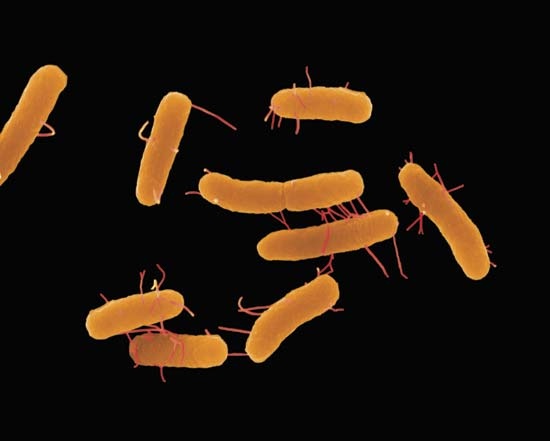prokaryote
cell
also spelled procaryote
 any organism that lacks a distinct nucleus and other organelles due to the absence of internal membranes. Bacteria are among the best-known prokaryotic organisms. The lack of internal membranes in prokaryotes distinguishes them from eukaryotes (eukaryote). The prokaryotic cell membrane is made up of phospholipids and constitutes the cell's primary osmotic barrier. The cytoplasm contains ribosomes, which carry out protein synthesis, and a double-stranded deoxyribonucleic acid (DNA) chromosome, which is usually circular. Many prokaryotes also contain additional circular DNA molecules called plasmids (plasmid), with additional dispensable cell functions, such as encoding proteins to inactivate antibiotics. Some prokaryotes have flagella (flagellum). Prokaryotic flagella are distinct in design and movement from the flagella found on some eukaryotes. See also eukaryote; bacteria.
any organism that lacks a distinct nucleus and other organelles due to the absence of internal membranes. Bacteria are among the best-known prokaryotic organisms. The lack of internal membranes in prokaryotes distinguishes them from eukaryotes (eukaryote). The prokaryotic cell membrane is made up of phospholipids and constitutes the cell's primary osmotic barrier. The cytoplasm contains ribosomes, which carry out protein synthesis, and a double-stranded deoxyribonucleic acid (DNA) chromosome, which is usually circular. Many prokaryotes also contain additional circular DNA molecules called plasmids (plasmid), with additional dispensable cell functions, such as encoding proteins to inactivate antibiotics. Some prokaryotes have flagella (flagellum). Prokaryotic flagella are distinct in design and movement from the flagella found on some eukaryotes. See also eukaryote; bacteria.- William Caslon
- William Cavendish, 1st Duke of Newcastle-upon-Tyne
- William Cavendish Newcastle-upon-Tyne, 1st Duke of
- William Caxton
- William C Bullitt
- William Cecil, 1st Baron Burghley
- William Chandler Bagley
- William Charles Macready
- William Cheselden
- William Christian
- William Claiborne
- William Clark
- William Clito
- William Cobbett
- William Cockerill
- William Coddington
- William Collins
- William Combe
- William Congreve
- William Conyngham Plunket, 1st Baron Plunket
- William Conyngham Plunket Plunket, 1st Baron
- William Cookworthy
- William Cooper Procter
- William Corless Mills
- William Cornysh